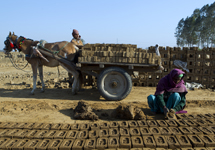A new farrier certification which could help almost one million working equines in Senegal — and create jobs — has been described as a “significant milestone”.
Welfare charity Brooke, which is training 100 people in different regions in Senegal, is to launch an accredited certificate in farriery from 2020.
{"content":"PHA+VGhpcyBjb21lcyBhcyBwYXJ0IG9mIHRoZSBjaGFyaXR54oCZcyBnbG9iYWwgcHJvamVjdCBhaW1pbmcgdG8gcmFpc2UgdGhlIHByb2ZpbGUgb2YgZmFycmllcnkgaW4gbG93LSBhbmQgbWlkZGxlLWluY29tZSBjb3VudHJpZXMgdGhhdCBsYWNrIHRyYWluaW5nIGFuZCB0b29scywgYW5kIGl0IGlzIGhvcGVkIG90aGVyIGNvdW50cmllcyB3aWxsIGZvbGxvdyBzdWl0IGJ5IHByb3ZpZGluZyBjb21tdW5pdGllcyB3aXRoIG9mZmljaWFsIHJvdXRlcyB0byBnYWluaW5nIHF1YWxpZmljYXRpb25zLjwvcD4KPHA+QnJvb2tlIFdlc3QgQWZyaWNhIHByb2dyYW1tZSBtYW5hZ2VyIE1hY3RhciBTZWNrIHRvbGQgPGVtPkgmYW1wO0g8L2VtPiB0aGUgY291bnRyeSBoYXMgb25lIG1pbGxpb24gd29ya2luZyBlcXVpbmVzLCBhbmQgYW4gdW5yZWd1bGF0ZWQgc3lzdGVtIG1lYW50IHVudHJhaW5lZCBibGFja3NtaXRocyBhbmQgd29vZHdvcmtlcnMgd2VyZSB0cmltbWluZyBhbmQgc2hvZWluZyBob3JzZXMuPC9wPgo8cD48ZGl2IGNsYXNzPSJhZC1jb250YWluZXIgYWQtY29udGFpbmVyLS1tb2JpbGUiPjxkaXYgaWQ9InBvc3QtaW5saW5lLTIiIGNsYXNzPSJpcGMtYWR2ZXJ0Ij48L2Rpdj48L2Rpdj48c2VjdGlvbiBpZD0iZW1iZWRfY29kZS0zMSIgY2xhc3M9ImhpZGRlbi1tZCBoaWRkZW4tbGcgcy1jb250YWluZXIgc3RpY2t5LWFuY2hvciBoaWRlLXdpZGdldC10aXRsZSB3aWRnZXRfZW1iZWRfY29kZSBwcmVtaXVtX2lubGluZV8yIj48c2VjdGlvbiBjbGFzcz0icy1jb250YWluZXIgbGlzdGluZy0tc2luZ2xlIGxpc3RpbmctLXNpbmdsZS1zaGFyZXRocm91Z2ggaW1hZ2UtYXNwZWN0LWxhbmRzY2FwZSBkZWZhdWx0IHNoYXJldGhyb3VnaC1hZCBzaGFyZXRocm91Z2gtYWQtaGlkZGVuIj4NCiAgPGRpdiBjbGFzcz0icy1jb250YWluZXJfX2lubmVyIj4NCiAgICA8dWw+DQogICAgICA8bGkgaWQ9Im5hdGl2ZS1jb250ZW50LW1vYmlsZSIgY2xhc3M9Imxpc3RpbmctaXRlbSI+DQogICAgICA8L2xpPg0KICAgIDwvdWw+DQogIDwvZGl2Pg0KPC9zZWN0aW9uPjwvc2VjdGlvbj48L3A+CjxwPuKAnFRoZXkgZG9u4oCZdCBoYXZlIHRoZSBrbm93bGVkZ2Ugb3IgdGhlIHNraWxscyBzbyBnZW5lcmFsbHkgY2F1c2UgaGFybSB0byB0aGUgYW5pbWFsLOKAnSBoZSBzYWlkLiDigJxCZWZvcmUgd2Ugc3RhcnRlZCB0aGUgcHJvamVjdCB3ZSBhc3Nlc3NlZCB0aGF0IG1vcmUgdGhhbiA4MCUgb2YgdGhlIHdvcmtpbmcgZXF1aW5lcyB3ZXJlIHN1ZmZlcmluZyBmcm9tIGhvb2YgYWJub3JtYWxpdGllcyBhbmQgaW5mZWN0aW9ucy7igJ08L3A+CjxwPk1yIFNlY2sgc2FpZCB0aGUgY2VydGlmaWNhdGUsIHdoaWNoIGlzIGdyYW50ZWQgYWZ0ZXIgYSB5ZWFy4oCZcyB0cmFpbmluZywgd2lsbCBiZSBpbnRlZ3JhdGVkIGludG8gYSBzdGF0ZS1mdW5kZWQgcHJvZ3JhbW1lLjwvcD4KPHA+4oCcV2UgaG9wZSBhdCB0aGUgZW5kIG9mIHRoZSBwcm9jZXNzIHdlIHdpbGwgaGF2ZSBjZXJ0aWZpZWQgZmFycmllcnMgd2hvIGNhbiB0cmltIG9yIHNob2UgYW5pbWFscy4gVGhlIGZhcnJpZXIgc2VjdG9yIHdhcyBjb21wbGV0ZWx5IG92ZXJsb29rZWQgYmVmb3JlIGFuZCBub3cgaXTigJlzIGJlaW5nIHRha2VuIGludG8gYWNjb3VudCBieSB0aGUgbWluaXN0ZXIgb2YgcHJvZmVzc2lvbmFsIHRyYWluaW5nIGFuZCB0aGUgbWluaXN0ZXIgb2YgbGl2ZXN0b2NrLCBzbyBpdOKAmWEgZ29vZCBhY2hpZXZlbWVudC48L3A+CjxkaXYgY2xhc3M9ImFkLWNvbnRhaW5lciBhZC1jb250YWluZXItLW1vYmlsZSI+PGRpdiBpZD0icG9zdC1pbmxpbmUtMyIgY2xhc3M9ImlwYy1hZHZlcnQiPjwvZGl2PjwvZGl2Pgo8cD7igJxGYXJyaWVycyBhcmUgd2VsY29tZWQgYnkgb3duZXJzIGJlY2F1c2UgdGhleSBjYW4gc2VlIHRoZSBkaWZmZXJlbmNlIHRoZXkgY2FuIG1ha2Ugc28gdGhleSBhcmUgaGFwcHkgdGhpcyB0cmFpbmluZyBpcyBnb2luZyBvbi7igJ08L3A+CjxwPkJyb29rZSBXZXN0IEFmcmljYSByZWdpb25hbCByZXByZXNlbnRhdGl2ZSBFbW1hbnVlbCBCb3Vyw6kgU2FyciBzYWlkIHRoZSBsYXVuY2ggb2YgdGhlIGNlcnRpZmljYXRlIHdhcyBhIOKAnGhpc3RvcmljIG1vbWVudOKAnSBmb3IgU2VuZWdhbC48L3A+CjxkaXYgY2xhc3M9ImFkLWNvbnRhaW5lciBhZC1jb250YWluZXItLW1vYmlsZSI+PGRpdiBpZD0icG9zdC1pbmxpbmUtNCIgY2xhc3M9ImlwYy1hZHZlcnQiPjwvZGl2PjwvZGl2Pgo8cD7igJxBIGZldyB5ZWFycyBhZ28gZmFycmllcnkgd2FzIGNvbnNpZGVyZWQgYXMg4oCYbG93IHdvcmvigJksIGJ1dCB0aGFua3MgdG8gQnJvb2tlIGl04oCZcyBub3cgYmVjb21pbmcgYSBmdWxsIHByb2Zlc3Npb24uIEkgYmVsaWV2ZSB0aGlzIHdpbGwgaGF2ZSBhIGdyZWF0bHkgcG9zaXRpdmUgZWZmZWN0IG9uIHRoZSBsaXZlcyBvZiB3b3JraW5nIGVxdWluZXMgaW4gdGhpcyBjb3VudHJ5IGFuZCBjcmVhdGUgam9icyBmb3IgeWVhcnMgdG8gY29tZSzigJ0gaGUgc2FpZC48L3A+CjxwPkRhdmlkIEJ1Y2t0b24sIGltbWVkaWF0ZSBwYXN0IG1hc3RlciBmb3IgdGhlIFdvcnNoaXBmdWwgQ29tcGFueSBvZiBGYXJyaWVycywgd2hvIGF0dGVuZGVkIGEgcHJlc2VudGF0aW9uIG9uIHRoZSBjaGFyaXR54oCZcyBnbG9iYWwgZmFycmllcnkgcHJvamVjdCwgc2FpZDog4oCcSGF2aW5nIHRoZSBtaW5pc3RyeSBvZiB0cmFpbmluZyByZWNvZ25pc2UgZmFycmllcnkgaW4gU2VuZWdhbCBtdXN0IGJlIG11Y2ggbGlrZSBpdCB3YXMgaW4gMTM1NiB3aGVuIHRoZSBmaXJzdCBmZWxsb3dzaGlwIG9mIGZhcnJpZXJzIHdhcyBlc3RhYmxpc2hlZCBpbiBMb25kb24sIHN0YXJ0aW5nIGEgbG9uZyBsZWdhY3kgb2YgY3JhZnQgZmFycmllcnkgd2l0aGluIHRoZSBVSy48L3A+CjxkaXYgY2xhc3M9ImFkLWNvbnRhaW5lciBhZC1jb250YWluZXItLW1vYmlsZSI+PGRpdiBpZD0icG9zdC1pbmxpbmUtNSIgY2xhc3M9ImlwYy1hZHZlcnQiPjwvZGl2PjwvZGl2Pgo8cD7igJxJIHdhcyB2ZXJ5IGltcHJlc3NlZCB0byBzZWUgdGhlIHBsYW5zIGZvciB0aGUgcHJvamVjdCwgd2hpY2ggd2lsbCBub3Qgb25seSBpbXByb3ZlIHRoZSB3ZWxmYXJlIG9mIHdvcmtpbmcgaG9yc2VzIGFuZCBkb25rZXlzIGJ1dCBhbHNvIGluc3BpcmUgcHJvc3BlY3RpdmUgZmFycmllcnMgYW5kIGJlIG9mIGdyZWF0IGJlbmVmaXQgdG8gZmFtaWxpZXMgd2hvIHJlbHkgb24gdGhlc2UgYW5pbWFscyBmb3IgYSBsaXZpbmcuIFRoaXMgaXMgYSBzaWduaWZpY2FudCBtaWxlc3RvbmUgYW5kIG1heSBpdCBiZSB0aGUgZmlyc3Qgb2YgZnVydGhlciBzdWNjZXNzZXMgd2l0aGluIGdsb2JhbCBmYXJyaWVyeS7igJ08L3A+CjxkaXYgY2xhc3M9ImluamVjdGlvbiI+PC9kaXY+CjxwPkZhcnJpZXIgRmF0b3UgVG91cmUsIGEgZm9ybWVyIG1ldGFsIHdvcmtlciB3aG8gdW5kZXJ0b29rIHRoZSB0cmFpbmluZyBmcm9tIEJyb29rZSBhbmQgaXRzIHBhcnRuZXIgdGhlIFNlbmVnYWxlc2UgQXNzb2NpYXRpb24gZm9yIHRoZSBQcm90ZWN0aW9uIG9mIEFuaW1hbHMgYW5kIHRoZSBFbnZpcm9ubWVudCwgaGVscHMgbWVudG9yIG5ldyBmYXJyaWVycyBhbmQgaGFzIHN1cHBvcnRlZCB0aGUgY2hhcml0eeKAmXMgd29yayBjcmVhdGluZyB0aGUgY2VydGlmaWNhdGlvbi48L3A+CjxwPuKAnFRoZSB0cmFpbmluZyBoYXMgYmVlbiB2ZXJ5IHVzZWZ1bCB0byBtZS4gV2hhdCByZWFsbHkgZ2l2ZXMgbWUgY29udGVudG1lbnQgYXJlIHRoZSBob3JzZXMgZnJvbSBteSBuZWlnaGJvdXJob29kIHdobyBhcmUgYnJvdWdodCB0byBteSBob3VzZSBmb3IgdHJpbW1pbmcgYW5kIHRoZSBvd25lcnMgZ28gYmFjayBzYXRpc2ZpZWQs4oCdIHNoZSBzYWlkLjwvcD4KPHA+Cg=="}
You might also be interested in…
Credit: Alamy Stock Photo
Credit: RSPCA
‘Buying horses out of perceived welfare situations is not rescuing; it is creating a market for horses to receive poor
The Brooke has released a report titled "Invisible Workers"
Equine charity comes to the aid of horses, donkeys and mules affected by the earthquake
This year, the Brooke will provide support to over 1,000 brick kilns across India, which will directly benefit 45,000 working
Stay in touch with all the news in the run-up to and throughout the major shows and events during 2026 and beyond with a Horse & Hound subscription. Subscribe today for all you need to know ahead of these major events, plus online reports on the action as it happens from our expert team of reporters and in-depth analysis in our special commemorative magazines. Have a subscription already? Set up your unlimited website access now
H&H senior news writer
Since joining H&H in 2018, Becky has covered a broad range of equestrian news including welfare matters, veterinary studies, FEI Tribunal hearings and road safety campaigns. She has also interviewed top riders including Scott Brash, John Whitaker and Ian Stark, to name just a few. Becky’s reporting has taken her to Canada for Spruce Meadows and France for Pau five-star, as well as the Royal Highland and Blair Castle International Horse Trials closer to home. She was also a key part of the remote reporting team for the Tokyo Olympics and the Europeans.







